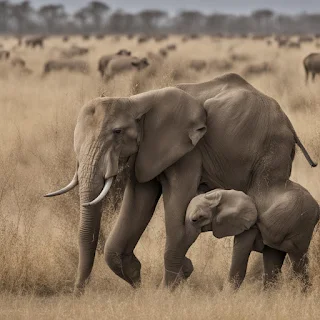"Self-Spreading Vaccines: A Promising Solution for Wildlife Conservation and Public Health"
In the intricate world of plants, a groundbreaking discovery is unfolding. While we have long known about the chemical messages plants release into the air, a new frontier of root communication is now being unmasked. Emilio Guerrieri and Sergio Rasmann are offering a peek into the mysterious world of belowground plant communication, where roots speak a language of their own, signaling growth changes and impending threats to neighboring plants. The potential applications of this hidden dialogue could revolutionize crop protection, habitat restoration, and deepen our understanding of plant biology and ecology.
Shifting our focus from the soil to the skies, a tiny bacterium called Wolbachia is emerging as a valuable ally in the fight against mosquito-borne diseases. Having demonstrated its prowess in curbing dengue transmission, this microbial hero is now joined by Rosenbergiella_YN46, a gut bacterium that hampers the infectivity of both dengue and Zika viruses. With mosquitoes evolving resistance to insecticides, these microbial warriors offer a promising new frontier in disease control, providing hope in the battle against these lethal illnesses.
Venturing into the realm of vaccines, a daring proposal is taking center stage. Imagine vaccines that spread themselves, protecting wildlife and people alike from deadly diseases. In the wake of devastating Ebola outbreaks that decimated wildlife populations, the concept of self-spreading vaccines is gaining traction. While controversial in the past, a team of experts is now laying out a framework to transform this bold vision into reality. By meticulously designing vaccines and engaging stakeholders worldwide, these revolutionary vaccines could pave the way for a healthier coexistence between humans and animals.
But while the natural world buzzes with new discoveries, the shadows cast by addiction loom large over the human brain. Delving into the neuroscience of addiction, scientists are unraveling the intricate mechanisms through which addictive substances hijack our brains' reward pathways. From the rapid euphoria induced by cocaine to the long-term rewiring of neural circuits, these studies shed light on the insidious grip of addiction. By decoding the molecular changes in key brain regions, researchers are paving the way for a deeper understanding of addiction and potentially more effective treatments for substance use disorders.
As science unfurls its tapestry of discoveries, from the secret conversations of plants to the microbial warriors combatting diseases, each revelation opens new vistas of possibility. The journey of exploration continues, illuminating the path towards a brighter, healthier future for both nature and humanity.
Source: https://www.science.org/content/article/scienceadviser-vaccines-spread-themselves-could-save-wildlife-and-protect-people-if
Shifting our focus from the soil to the skies, a tiny bacterium called Wolbachia is emerging as a valuable ally in the fight against mosquito-borne diseases. Having demonstrated its prowess in curbing dengue transmission, this microbial hero is now joined by Rosenbergiella_YN46, a gut bacterium that hampers the infectivity of both dengue and Zika viruses. With mosquitoes evolving resistance to insecticides, these microbial warriors offer a promising new frontier in disease control, providing hope in the battle against these lethal illnesses.
Venturing into the realm of vaccines, a daring proposal is taking center stage. Imagine vaccines that spread themselves, protecting wildlife and people alike from deadly diseases. In the wake of devastating Ebola outbreaks that decimated wildlife populations, the concept of self-spreading vaccines is gaining traction. While controversial in the past, a team of experts is now laying out a framework to transform this bold vision into reality. By meticulously designing vaccines and engaging stakeholders worldwide, these revolutionary vaccines could pave the way for a healthier coexistence between humans and animals.
But while the natural world buzzes with new discoveries, the shadows cast by addiction loom large over the human brain. Delving into the neuroscience of addiction, scientists are unraveling the intricate mechanisms through which addictive substances hijack our brains' reward pathways. From the rapid euphoria induced by cocaine to the long-term rewiring of neural circuits, these studies shed light on the insidious grip of addiction. By decoding the molecular changes in key brain regions, researchers are paving the way for a deeper understanding of addiction and potentially more effective treatments for substance use disorders.
As science unfurls its tapestry of discoveries, from the secret conversations of plants to the microbial warriors combatting diseases, each revelation opens new vistas of possibility. The journey of exploration continues, illuminating the path towards a brighter, healthier future for both nature and humanity.
Source: https://www.science.org/content/article/scienceadviser-vaccines-spread-themselves-could-save-wildlife-and-protect-people-if


Comments
Post a Comment